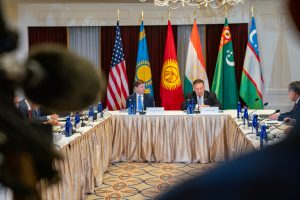UPDATE: On January 1, the U.S. State Department announced that Pompeo’s upcoming trip would be postponed due to tensions in the Middle East.
***
U.S. Secretary of State Mike Pompeo is set to sweep through Central Asia over the weekend. After stops in Ukraine and Belarus, Pompeo will make a brief stop in Kazakhstan before heading on to Uzbekistan for a meeting of the C5+1. On his way back to the United States, Pompeo will visit Cyprus.
According to a press statement on December 30, Pompeo will travel to Nur-Sultan, the Kazakh capital, from Minsk on January 4. Pompeo will meet with President Kassym-Jomart Tokayev, First President Nursultan Nazarbayev and Foreign Minister Mukhtar Tleuberdi on January 5.
Pompeo will then travel to the Uzbek capital, Tashkent, to meet with President Shavkat Mirziyoyev and Foreign Minister Abdulaziz Kamilov. He will then participate in a C5+1 Ministerial with the foreign ministers of Kazakhstan, Kyrgyzstan, Tajikistan, Turkmenistan, and Uzbekistan.
In a special briefing, a senior State Department official outlined the contours for the secretary’s visit. The official emphasizes U.S. commitment to the “independence, sovereignty, and territorial integrity” of the countries of Central Asia. Such language comes up repeatedly when discussing the region with American officials. The subtext is that the region’s other partners — Russia and China — are less respecting of that particular trifecta.
“The United States is committed to improving Kazakhstan’s and Uzbekistan’s connections to the global economy so they do not become dependent on any one country for trade and development,” the official said. “We believe that Kazakhstan and Uzbekistan should have the freedom to pursue their national interests, to choose from a variety of partners and to align themselves politically, economically, and militarily on their own terms.”
Earlier this month, U.S. Ambassador to Uzbekistan Daniel Rosenblum spoke candidly with The Diplomat about U.S. interests in Uzbekistan and views on the regional geopolitical balance. From my earlier reporting:
“We know we’re not going to be the only partner” to the countries of Central Asia, Rosenblum said, but “our general view is that the countries of the region can benefit from having diverse partners and diverse relationships.”
Pushing out Russia or China is just “not realistic,” Rosenblum said, and that’s not the main thrust of the new strategy. But on the other hand, the United States, he said, has a legitimate place in the region. “We have something to offer that is off mutual benefit… and so we’re going to keep pursuing those kinds if partnerships.”
Pompeo’s trip serves as a reminder of the America option.
The State Department official noted that in Nur-Sultan, Pompeo would “reaffirm our enhanced strategic partnership and discuss avenues to increase bilateral trade and investment.” The official also noted the transition of power from Nazarbayev to Tokayev earlier in 2019. “President Tokayev has made encouraging commitments to political and economic reform, and we look forward to implementation of those commitments.”
In Tashkent, Pompeo will “reinforce our support for President Mirziyoyev’s reform agenda.” The U.S. has eagerly watched reforms in Uzbekistan as they have opened the way for cooperation that was impossible under the later Karimov regime.
Pompeo will then attend a gathering of the C5+1. The C5+1 platform was launched in 2015 to bring together the foreign ministers of the five Central Asian states with their U.S. counterpart more regularly. The group last met in September on the sidelines of the UN General Assembly.
Looking beyond the press release and briefing, to the wider regional environment we can expect the usual topics — trade, investment, terrorism — to be accompanied by more detailed discussions about Afghanistan and China. We may not get a public version of those conversations, but they are bound to occur.
In Afghanistan, the latest news puts out feelers for a cease-fire: The Associated Press reported Sunday that the Taliban’s ruling council had agreed to enact a temporary cease-fire. The report included no guess as to the date and no official U.S. comment. On Monday, the AFP reported on the Taliban denying any such cease-fire was in the works. The U.S. and Afghan governments have long insisted on a cease-fire as a first step in any kind of peace settlement.
Uzbekistan, in particular, has undergone a major shift in how it positions itself vis-a-vis Afghanistan. Tashkent has engaged in its own efforts to coax the peace process along, including offering Samarkand as a venue for negotiations earlier this year and somewhat controversially hosting Taliban delegations in August 2018 and again in August 2019.
While we can expect conversations about Afghanistan to be had, we can’t necessarily expect to hear the details. On China, also, there are bound to be serious conversations but unlikely spectacular results. When asked about Pompeo’s hopes to build “an international coalition of governments pushing back against Beijing regarding its building of mass internment camps for Muslim ethnic minorities in Xinjiang,” the State Department official commented that the U.S. has raised these issues with the governments of Central Asia. “We expect the Secretary to be discussing this issue both in his bilateral relations during – bilateral meetings during this trip as well as it to come up as well at the C5+1 again,” the official said, going on to note: “We have not seen any kind of significant improvement in the situation there. We continue to raise it with our partners and allies and likeminded countries around the world, and it will certainly be a subject on this trip.”
Washington will have better luck discussing Afghanistan than China with the states of Central Asia. So far, none of the Central Asian states have come out strongly (or at all) against the internment of Muslim minorities — including Kazakhs, Kyrgyz and others — in Xinjiang.
On Twitter, the Chinese Ministry of Foreign Affairs fired a pre-emptive shot across Pompeo’s bow in this regard:
https://twitter.com/MFA_China/status/1211964399742676993

































